FIND THE LENGTH OF THE DIAGONAL OF EACH SQUARE
Subscribe to our ▶️ YouTube channel 🔴 for the latest videos, updates, and tips.
The Formula the Area of a Square,
Area = s2 sq. units
The Formula the Diagonal of a Square,
d = s√2 units
(where s is the side and d is the diagonal of a square)
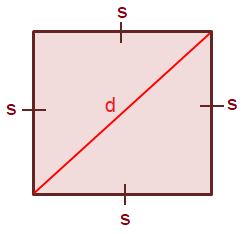
Find the length of the diagonal of each square. Round your answer to the nearest tenth.
Problem 1 :
Side length = 2 yd
Solution :
Given, side length (s) = 2 yd
Diagonal (d) = s√2
d = 2√2
= 2(1.414)
d = 2 .8 yd
Problem 2 :
Side length = 53 ft
Solution :
Given, side length (s) = 53 ft
Diagonal (d) = s√2
d = 53√2
= 53(1.414)
d = 75 ft
Problem 3 :
Side length = 17.3 in
Solution :
Given, side length (s) = 17.3 in
Diagonal (d) = s√2
d = 17.3√2
= 17.3(1.414)
d = 24 .5 in
Problem 4 :
Side length = 95 yd
Solution :
Given, side length (s) = 95 yd
Diagonal (d) = s√2
d = 95√2
= 95(1.414)
d = 134 .3 yd
Find the length of the diagonal of each square. Round your answer to the nearest tenth.
Problem 5 :
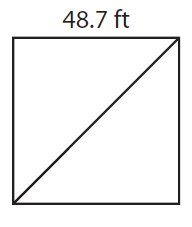
Solution :
By observing the figure,
Side length (s) = 48.7 ft
Diagonal (d) = s√2
d = 48.7√2
= 48.7(1.414)
d = 68 .9 ft
Problem 6 :
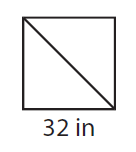
Solution :
By observing the figure,
Side length (s) = 32 in
Diagonal (d) = s√2
d = 32√2
= 32(1.414)
d = 45.2 in
Problem 7 :
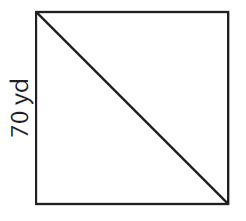
Solution :
By observing the figure,
Side length (s) = 70 yd
Diagonal (d) = s√2
d = 70√2
= 70(1.414)
d = 98.98 yd
Problem 8 :
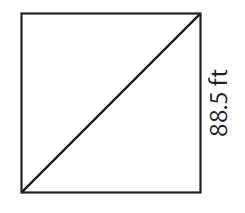
Solution :
By observing the figure,
Side length (s) = 88.5 ft
Diagonal (d) = s√2
d = 88.5√2
= 88.5(1.414)
d = 125 .14 ft
Problem 9 :
The side length of a square is 22 yards. What is the length of the diagonal?
Solution :
Given, side length (s) = 22 yards
Diagonal (d) = s√2
d = 22√2
= 22(1.414)
d = 31.108 yards
So, the length of the diagonal is 31.108 yards.
Problem 10 :
A man waliking at the speed of 4 kmph crosses a square field diagonally in 3 minutes. The area of the field is :
Solution :
Speed of the man = 4 x (5/18) m/sec
= 10/9 m/s
Time taken = 3 x 60
= 180 seconds
Lenght of diagonal = speed x times
= (10/9) x 180
= 200 m
Area of the square field = 1/2 ⋅ (diagonal) ⋅ diagonal
= (1/2) ⋅ 200 ⋅ 200
= 20000 square meter
Problem 11 :
A man walked diagonally across the square lot. approximately, what was the percent saved by not walking along the edges ?
Solution :
Let the side of the square be x meters.
Then AB + BC = 2x
AC = √2x
= 1.414x
Saving n 2x meters = 0.59x m
Saving = (0.59x/2x) ⋅100%
= 30%
So, the required percent is 30% approximately.
Problem 12 :
If the length of the diagonal of a square is 20 cm, then its perimeter must be :
a) 10√2 cm b) 40 cm c) 40√2 cm d) 200 cm
Solution :
Length of diagonal of square = 20 cm
Let x be the side length of square.
x2 + x2 = 202
2 x2 = 400
x2 = 400/2
x2 = 200
x = √200
= √(2 x 10 x 10)
= 10√2 cm
Perimeter of square = 4(side length)
= 4 x 10√2
= 40√2 cm
So, option c is correct.
Problem 13 :
The area of a square field 69696 cm2. Its diagonal will be equal to
a) 313.296 m b) 353.296 m c) 373.296 m d) 393.296 m
Solution :
Area of square = 63696
Let x be the side length of square.
x2 = 69696
x = √69696
x = 264
Length of diaognal = √2 (side length)
= √2 (264)
= 1.414 (264)
= 373.296 m
So, option c is correct.
Problem 14 :
What will be the length of the diagonal of that square plot whose area is equal to the area of a rectangular plot of the length 45 meters and breadth 40 meters?
a) 42.5 m b) 60 m c) insufficient d) none
Solution :
Length of rectangle = 45 m
breadth = 40 m
Area of rectangular plot = length x breadth
= 45 x 40
= 1800
Area of square = 1800
Let x be the side length of square.
x2 = 1800
x = √1800
= √2 x 30 x 30
= 30√2
= 30(1.414)
= 42.4 m
Approximately 42.5 m.
Problem 15 :
The diagonal of a square is 4√2 cm. The diagonal of another square whose area is double that of the first square, is
a) 8 cm b) 8√2 cm c) 4√2 cm d) 16 cm
Solution :
The diagonal of a square = 4√2 cm
Area of the square = a2
Area of first square = √2(4√2)
= 4(2)
= 8 cm2
Double the area of the first square = 8(2)
= 16
Diagonal of another square = 16 cm
So, option d is correct.
Subscribe to our ▶️ YouTube channel 🔴 for the latest videos, updates, and tips.
Recent Articles
-
Finding Range of Values Inequality Problems
May 21, 24 08:51 PM
Finding Range of Values Inequality Problems -
Solving Two Step Inequality Word Problems
May 21, 24 08:51 AM
Solving Two Step Inequality Word Problems -
Exponential Function Context and Data Modeling
May 20, 24 10:45 PM
Exponential Function Context and Data Modeling